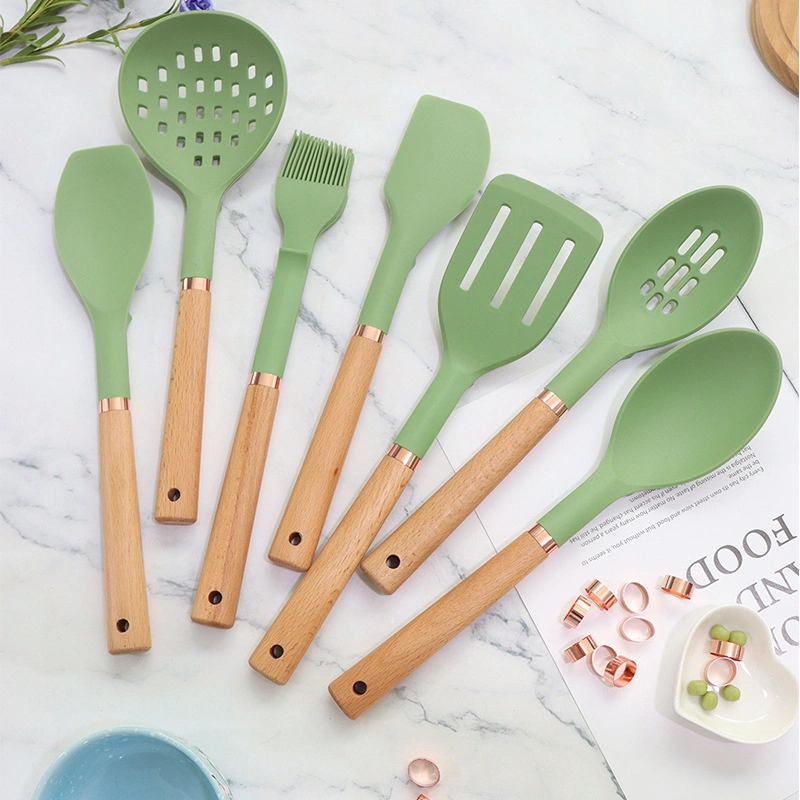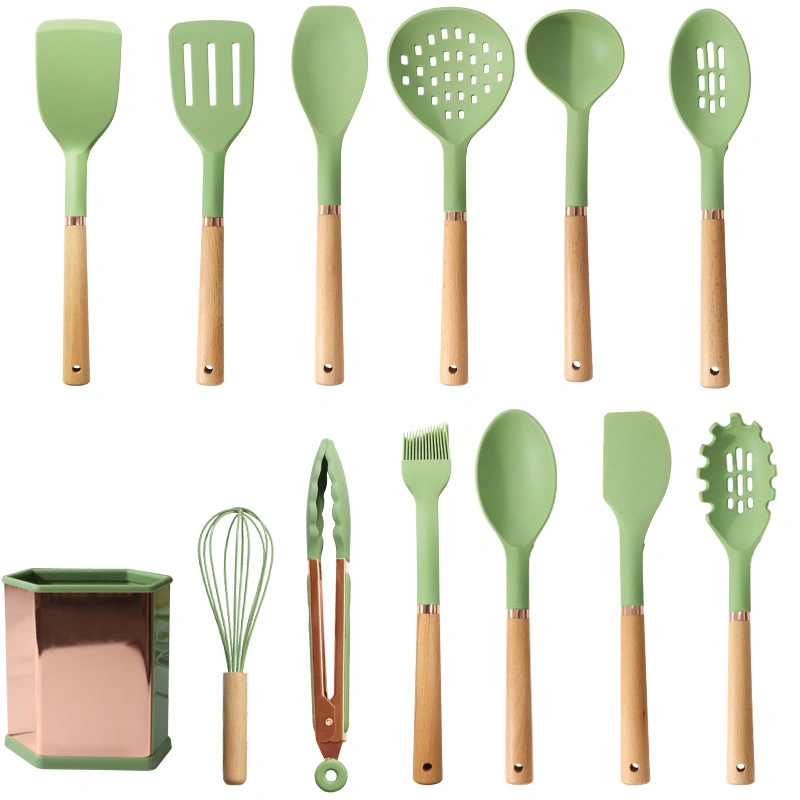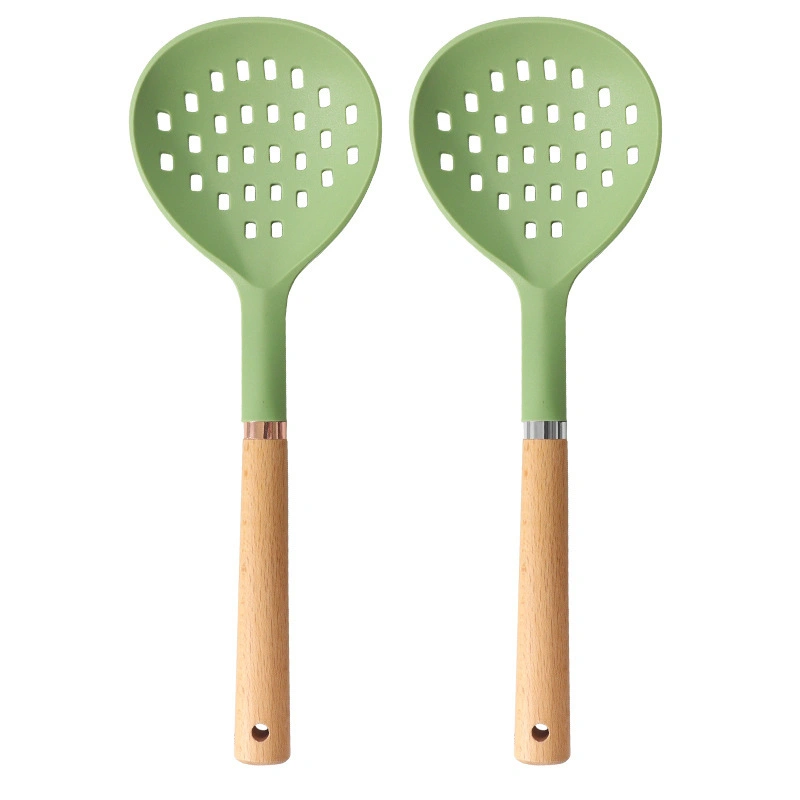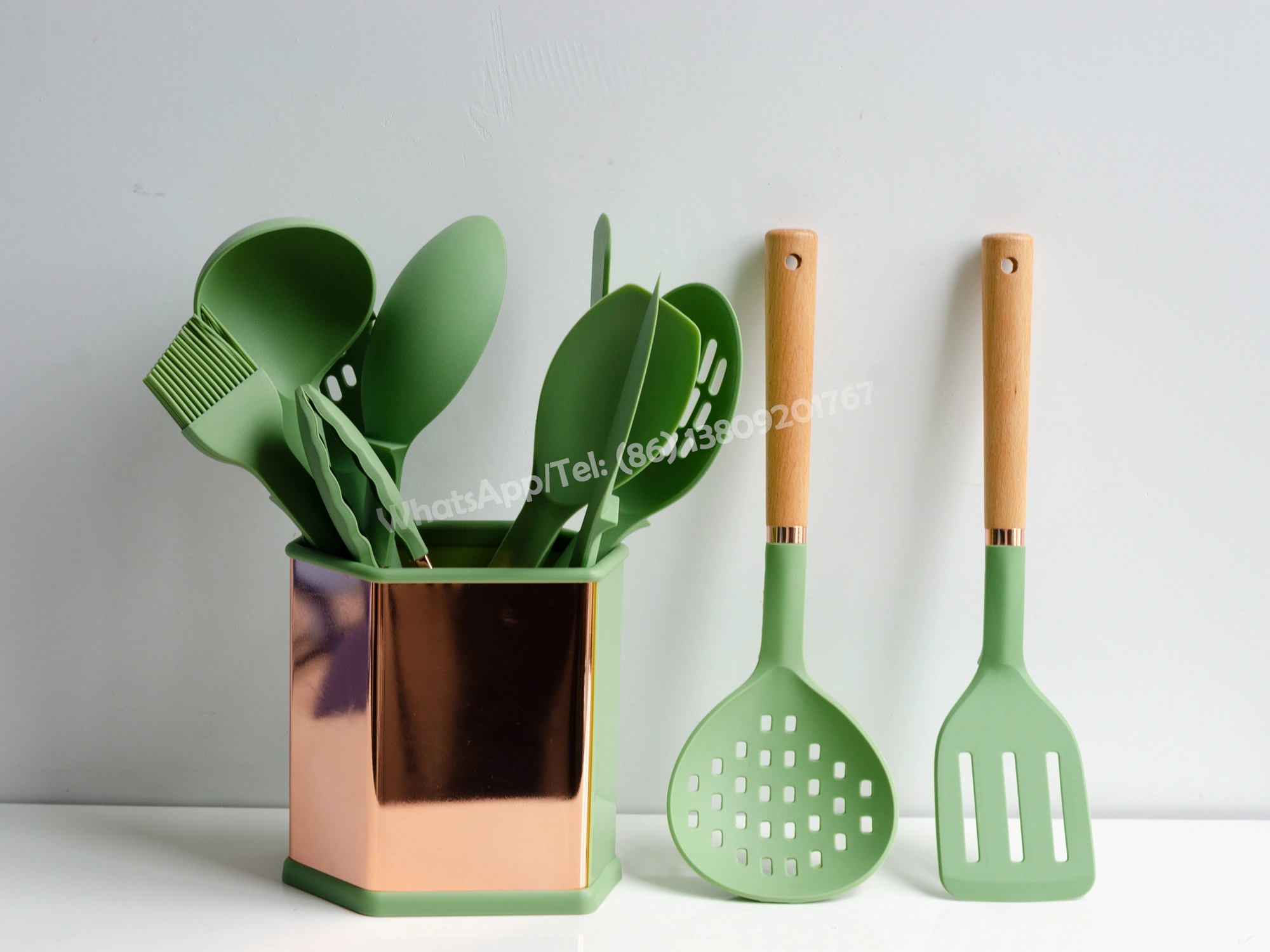Pros of Using Silicone Kitchen Cooking Utensils

Silicone kitchen cooking utensils have become increasingly popular in recent years due to their many advantages. One of the main benefits of using silicone utensils is their durability. Unlike traditional kitchen utensils made of wood or metal, silicone utensils are resistant to high temperatures and are less likely to warp or melt when exposed to heat. This makes them ideal for use in cooking and baking, where high temperatures are often required.
Another advantage of silicone kitchen cooking utensils is their non-stick properties. Silicone is naturally non-stick, which means that food is less likely to stick to the utensils during cooking. This makes them easier to clean and helps to prevent food from burning or sticking to the utensils, making cooking and baking a more enjoyable experience.
Silicone utensils are also non-reactive, which means that they do not react with acidic or alkaline foods. This makes them safe to use with a wide range of ingredients, including tomatoes, citrus fruits, and vinegar. Silicone utensils are also non-toxic and do not leach harmful chemicals into food, making them a safe and healthy choice for cooking and baking.
In addition to their durability, non-stick properties, and non-reactive nature, silicone kitchen cooking utensils are also easy to clean. Silicone is dishwasher safe, making it easy to clean and sanitize after each use. Silicone utensils are also stain-resistant, so they will not absorb odors or colors from food, ensuring that they remain looking new for longer.
Despite their many advantages, silicone kitchen cooking utensils do have some disadvantages. One of the main drawbacks of silicone utensils is that they can be more expensive than traditional utensils made of wood or metal. However, many people find that the durability and longevity of silicone utensils make them a worthwhile investment in the long run.
Another disadvantage of silicone kitchen cooking utensils is that they can be prone to tearing or puncturing if not used and cared for properly. It is important to avoid using sharp knives or utensils on silicone surfaces, as this can cause damage to the utensils. Additionally, silicone utensils should be stored properly to prevent them from becoming misshapen or damaged over time.
In conclusion, silicone kitchen cooking utensils offer many advantages, including durability, non-stick properties, non-reactive nature, and ease of cleaning. While they may be more expensive than traditional utensils, many people find that the benefits of silicone utensils outweigh the cost. However, it is important to use and care for silicone utensils properly to ensure that they remain in good condition for as long as possible. Overall, silicone kitchen cooking utensils are a great choice for anyone looking for high-quality, safe, and easy-to-use kitchen utensils.
Cons of Using Silicone Kitchen Cooking Utensils

Silicone kitchen cooking utensils have become increasingly popular in recent years due to their many advantages. However, like any product, they also have their disadvantages. In this article, we will explore the cons of using silicone kitchen cooking utensils.
One of the main disadvantages of silicone kitchen cooking utensils is their durability. While silicone is a durable material, it is not as strong as metal or wood. This means that silicone utensils are more prone to breaking or bending under pressure. This can be particularly problematic when using silicone spatulas or tongs to flip heavy foods like steaks or burgers. In these cases, a metal or wooden utensil may be a better option.
Another disadvantage of silicone kitchen cooking utensils is their heat resistance. While silicone is heat resistant up to a certain temperature, it can still melt or warp if exposed to high heat for an extended period of time. This can be a problem when using silicone utensils in the oven or on the stovetop. It is important to carefully read the manufacturer’s instructions and guidelines for using silicone utensils to avoid damage.
In addition, silicone kitchen cooking utensils can be more difficult to clean than metal or wooden utensils. Silicone is a non-porous material, which means that food particles and oils can easily stick to its surface. This can make it challenging to thoroughly clean silicone utensils, especially if they have intricate designs or crevices. It is important to properly clean and sanitize silicone utensils after each use to prevent the growth of bacteria and mold.
Furthermore, silicone kitchen cooking utensils can be more expensive than traditional utensils made of metal or wood. While silicone utensils are often touted for their durability and longevity, they can come with a higher price tag. This may be a deterrent for some consumers who are looking for more budget-friendly options for their kitchen.
Another disadvantage of silicone kitchen cooking utensils is their lack of versatility. While silicone utensils are great for non-stick cookware and bakeware, they may not be suitable for all types of cooking. For example, silicone utensils may not be ideal for grilling or searing meats, as they may not provide the same level of heat conductivity as metal utensils. It is important to consider the specific needs of your cooking style before investing in silicone kitchen cooking utensils.
In conclusion, while silicone kitchen cooking utensils have many advantages, they also have their disadvantages. From durability and heat resistance to cleaning and cost, there are several factors to consider when deciding whether silicone utensils are the right choice for your kitchen. It is important to weigh the pros and cons of silicone utensils and consider your own cooking needs before making a decision.
How to Properly Care for Silicone Kitchen Cooking Utensils

Silicone kitchen cooking utensils have become increasingly popular in recent years due to their many advantages. These utensils are made from a flexible, heat-resistant material that is perfect for use in the kitchen. However, like any product, silicone utensils also have their disadvantages. In this article, we will explore the advantages and disadvantages of using silicone kitchen cooking utensils.
One of the main advantages of silicone kitchen cooking utensils is their durability. Unlike traditional kitchen utensils made from plastic or metal, silicone utensils are less likely to break or chip. This makes them a great investment for any kitchen, as they can withstand regular use without showing signs of wear and tear. Additionally, silicone utensils are heat-resistant, making them perfect for use in high-temperature cooking.
Another advantage of silicone kitchen cooking utensils is their non-stick properties. Silicone is naturally non-stick, which means that food is less likely to stick to the utensils during cooking. This makes them easy to clean and maintain, as food residue can be easily wiped away. Additionally, silicone utensils are dishwasher safe, making them convenient to use and clean.
Silicone kitchen cooking utensils are also versatile in their use. They can be used for a wide range of cooking tasks, from stirring and mixing to flipping and serving. Silicone utensils come in a variety of shapes and sizes, making them suitable for different types of cooking. Whether you are sautéing vegetables or baking a cake, silicone utensils can help you get the job done.
Despite their many advantages, silicone kitchen cooking utensils also have some disadvantages. One of the main disadvantages is that silicone utensils can be prone to staining. Certain foods, such as tomato-based sauces or curry, can leave stains on silicone utensils that are difficult to remove. To prevent staining, it is important to clean silicone utensils promptly after use and avoid using them with highly pigmented foods.
Another disadvantage of silicone kitchen cooking utensils is that they can be more expensive than traditional utensils. While silicone utensils are durable and long-lasting, they can be a larger upfront investment compared to plastic or metal utensils. However, many people find that the benefits of silicone utensils outweigh the cost, as they are easy to use and maintain.
In conclusion, silicone kitchen cooking utensils have many advantages, including durability, non-stick properties, and versatility. However, they also have some disadvantages, such as staining and cost. Overall, silicone utensils are a great addition to any kitchen and can make cooking tasks easier and more enjoyable. By properly caring for your silicone utensils and using them correctly, you can enjoy the benefits of these versatile kitchen tools for years to come.
Alternatives to Silicone Kitchen Cooking Utensils

Silicone kitchen cooking utensils have become increasingly popular in recent years due to their many advantages. These utensils are made from a flexible, heat-resistant material that is non-toxic and easy to clean. They come in a variety of shapes and sizes, making them versatile tools for cooking and baking. However, like any product, silicone kitchen cooking utensils also have their disadvantages.
One of the main advantages of silicone kitchen cooking utensils is their durability. Unlike traditional kitchen utensils made from wood or metal, silicone utensils are less likely to break or bend. This makes them a long-lasting investment for your kitchen. Additionally, silicone utensils are heat-resistant, meaning they can withstand high temperatures without melting or warping. This makes them ideal for use in the oven or on the stovetop.
Another advantage of silicone kitchen cooking utensils is their non-stick properties. Silicone is naturally non-stick, making it easy to clean and preventing food from sticking to the utensils. This can save you time and effort in the kitchen, as you won’t have to scrub or soak the utensils to remove stubborn food residue. Silicone utensils are also dishwasher safe, making them convenient to clean.
Silicone kitchen cooking utensils are also safe to use. Silicone is a non-toxic material that does not leach harmful chemicals into your food. This makes it a safe option for cooking and baking, especially when working with high temperatures. Additionally, silicone utensils are BPA-free, making them a healthier choice for your kitchen.
Despite their many advantages, silicone kitchen cooking utensils do have some disadvantages. One of the main drawbacks is their flexibility. While silicone utensils are flexible and bendable, this can make them less sturdy than traditional utensils made from wood or metal. This can be a disadvantage when working with heavy or dense foods, as the utensils may not provide enough support.
Another disadvantage of silicone kitchen cooking utensils is their tendency to retain odors. Silicone is a porous material, meaning it can absorb odors from strong-smelling foods. This can be a problem if you use the same utensil for different types of dishes, as the odors can transfer and affect the taste of your food. To prevent this, it is important to thoroughly clean and air out your silicone utensils after each use.
In conclusion, silicone kitchen cooking utensils have many advantages, including durability, heat-resistance, non-stick properties, and safety. However, they also have some disadvantages, such as flexibility and odor retention. Despite these drawbacks, silicone utensils are a popular choice for many home cooks due to their versatility and convenience. Whether you choose to use silicone kitchen cooking utensils or opt for traditional materials, it is important to consider your cooking needs and preferences to find the best tools for your kitchen.
